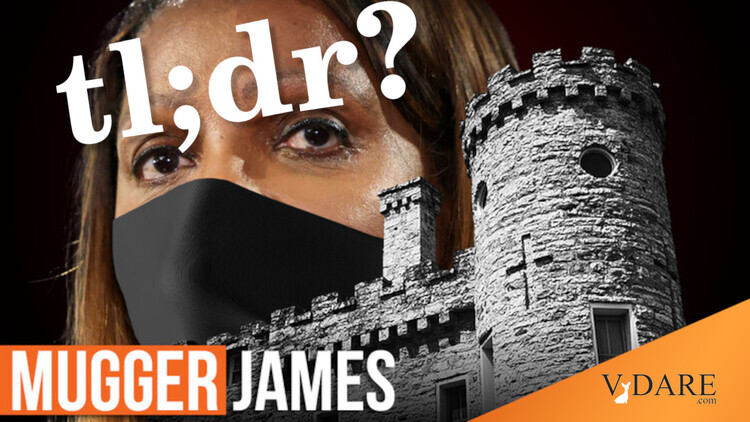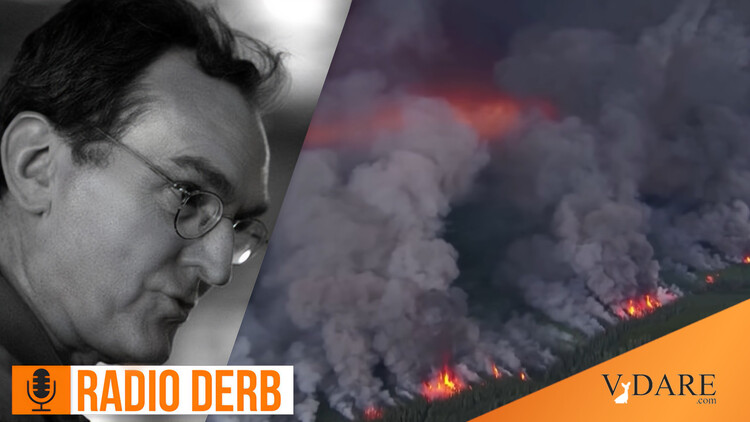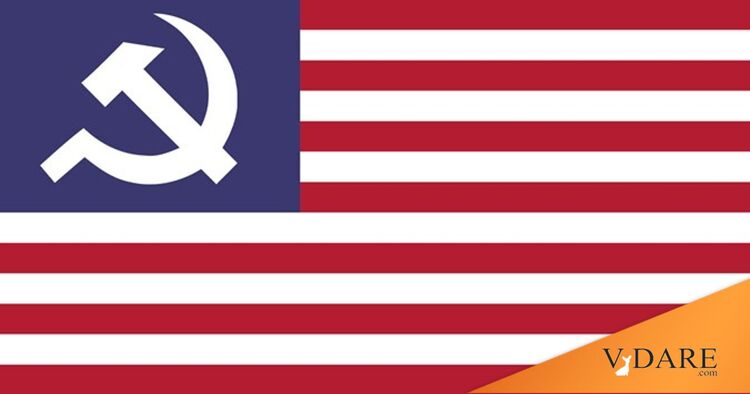Road trip. What better way to welcome summer than with a road trip? The Mrs and I closed out the month with a nine-day tour around Lake Ontario.
Kind friends in upstate New York allowed us to use their house as a base camp. We drove up there from Long Island, stayed overnight with them, then headed west to the Finger Lakes region, which has an astonishing quantity of wineries.
Who knew wine could be grown so far north? It's something to do with proximity to the great lake, we were told across the counter at one of the several wine-tastings we attended. The lake somehow softens the climate enough to make the hardier varieties of vine commercially viable.
So a night at Belhurst Castle on Seneca Lake, then westwards into southern Ontario to stay with different friends in a small town there.
 Canada is a major destination for bogus "refugees" and "asylum seekers" passed on to them by the United Nations. Government policy is to resettle as many as possible of these people in small towns like our friends' rather than in big cities. Small towns are cheaper, the politicians more easily bought, the inhabitants more trusting and naïve. The U.S. government of course operates on similar principles.
Canada is a major destination for bogus "refugees" and "asylum seekers" passed on to them by the United Nations. Government policy is to resettle as many as possible of these people in small towns like our friends' rather than in big cities. Small towns are cheaper, the politicians more easily bought, the inhabitants more trusting and naïve. The U.S. government of course operates on similar principles.
So this pleasant, quiet little provincial town is on the front lines of Canada's demographic revolution. Everyone has stories. Currently famous in the town is a "refugee" woman who has brought her (or "her": Canada's refugee programs don't do DNA testing) eleven children. The whole family (or "family") is of course on welfare.
Then east along the north shore of Lake Ontario and the great river for a night in Toronto, followed, after a 7½-hour drive, by two nights in Montreal; thence back down to Base Camp with our friends in upstate New York.
(When I first lived here in the early 1970s I worked in Westchester County, just north of New York City. I had a colleague who lived in Mahopac, twenty miles further north. With the geographical cluelessness of a newcomer, I once referred to my colleague's house as being "upstate," sending him into a fit of giggles. When he'd recovered he instructed me that "upstate" is w-a-a-ay further north than Mahopac. His wife's family, he further explained, came from a town named Peru which is so far north, the family did their shopping in Montreal. "That's upstate." When you come from a small country, this one is really big.)
Vague general impressions: Toronto. Toronto's something of a non-place. I quipped to Mrs  D that it is the Taipei of North America: that is, an important and populous city with nothing memorable in it to fix the traveller's attention: no Eiffel Tower, no Statue of Liberty, no Sydney Opera House or Buckingham Palace or Tiananmen Square.
D that it is the Taipei of North America: that is, an important and populous city with nothing memorable in it to fix the traveller's attention: no Eiffel Tower, no Statue of Liberty, no Sydney Opera House or Buckingham Palace or Tiananmen Square.
Yeah, yeah, there's that big spindly thing; but that just confuses the place in one's mind with Seattle. (And yeah, yeah, Taipei has the 101; but that's just an office building for crying out loud. Zzzzzz.)
I of course mean no offense to the good people of Toronto, who treated us very hospitably. An old acquaintance of ours, a native of the place, gave up his time to act as our tour guide. He seemed to know colorful details about the history of every building in the downtown district. To him especially, many thanks.
Dinner with Faith Goldy. I'm sure our Toronto guide won't mind my saying that the high point of our visit to his city was dinner with Faith Goldy, the fearless young lady who ran for Mayor of Toronto last year on a Dissident Right ticket: demographic stability and equality under the law.
 In other words, Faith's platform stressed opposition to both unrestrained mass immigration and affirmative action. For that she was of course labeled with all the cuss words in the CultMarx playbook: "far right," "white supremacist," "extremist," and so on.
In other words, Faith's platform stressed opposition to both unrestrained mass immigration and affirmative action. For that she was of course labeled with all the cuss words in the CultMarx playbook: "far right," "white supremacist," "extremist," and so on.
De-platforming naturally followed—literally, for the first public debate among mayoral candidates. In spite of running third in the polls, Faith was not invited to the debate. She mounted the platform anyway, and had to be hustled off by security personnel. As I said: fearless.
In conversation, Faith was pessimistic about the possibility of any sanity penetrating Canada's immigration policy. Her thoughts seem to be turning towards starting a family. (She recently married.)
Given her courage, intelligence, and beauty, I'd say that the loss to Canadian politics if she withdraws into private life would be more than compensated for by the gain to the larger gene pool. Still, I doubt the public sphere has seen the last of Faith Goldy.
Yellow Flight. Faith reminded me of the issue of Yellow Flight, which I have occasionally encountered in news stories from Toronto.
From the 1960s on, Chinese people settled in and around Toronto in great numbers. Some suburbs, notably Markham, became plurality Chinese.
In recent years lax immigration laws and the "refugee" rackets have brought more and more Sun People into these heavily-Chinese suburbs. Local Chinese have responded with protests and demonstrations. Now they are voting with their feet, to places further out—Yellow Flight.
Vague general impressions: Montreal. The main thing you need to know about Montreal in 2019 is that it is the world capital of infrastructure repair. That 7½-hour drive from Toronto should have been six hours; but as we got close to Montreal there were détours and closed-off lanes everywhere. I have never seen so much construction work.
 Our GPS went nuts, returning us again and again to the same spot after ten minutes of détours. At last I switched the fool thing off, fixed my eyes on a cluster of skyscrapers on the horizon, and headed for them with dogged concentration.
Our GPS went nuts, returning us again and again to the same spot after ten minutes of détours. At last I switched the fool thing off, fixed my eyes on a cluster of skyscrapers on the horizon, and headed for them with dogged concentration.
This worked and we made it to our downtown hotel at last. Walking out into the city streets, though, the sidewalks of central Montreal were just as addled with détours as the suburban expressways. What a mess! Have the Montreal city fathers come into a ton of money and decided to rebuild the place, or what?
Using the lemons to make lemonade, I shared with the long-suffering Mrs Derbyshire my theory that French is really just English written with a lot of surplus letters and pronounced with some nasal honking.
Me: "See this sign, TROTTOIR BARRÉ? Whaddya think it means?"
She: "Uh … well, I guess the second word is, like, 'barred' or 'barrier.'"
Me: "Right. And a trottoir is a trottery — a path you trot along."
She: "Why d'you have to trot?"
Me: "You don't have to. You can just walk in the regular way—amble, saunter, or stride. Well, I mean, you could if it wasn't barré. It's just a slightly different usage, like those Japanese characters that don't quite mean what the original Chinese means."
She: "Uh-huh. How about this one: VOIE BARRÉE? What's a voie?"
Me: "Think of a similar English word. Drop the 'E' and turn the 'I' into a 'Y': v-o-y- … What English word begins 'v-o-y-'?"
She: "Uhhh … Give up."
Me: "'Voyage'! When you take a voyage you go from one place to another. Well, a voie lets you do that. It's a path, a way."
She: "What's the difference with a trottoir? And why the extra 'e' on barrée?"
Me: "Look—a squirrel!"
If we stayed here long enough I would eventually get round to telling my spouse that the French-speakers of metropolitan France regard Québécois the way Englishmen regard broad Australian: as an uncouth colonial dialect spoken by bumpkins of doubtful sobriety.
Perhaps the Ulysses Press should work up a handbook of Dirty Québécois.
Montreal: A city of character. Montreal does have a distinguishing feature: like Edinburgh, it's a city with a mountain in the middle. Well, not exactly in the middle, but a mere longish walk from downtown.
We walked that walk after fortifying ourselves with a terrific brunch at what advertises itself—and you won't hear any argument from me—as the best dim sum restaurant in Montreal.
The mountain is officially the Mount Royal Park, laid out by Frederick Law Olmsted, the guy who did New York's Central Park. It's a lovely spot with sensational views of the city. There are woods and lawns, lakes and pavilions. Although, concerning those woods, checking later on Wikipedia I noted with interest that:
The lush forest has been badly damaged … by Mayor Drapeau's so-called morality cuts of the 1950s (to remove any opportunity for people to have sex in the bushes) …
Blessed with good weather, we spent most of the day on the mountain and in the pleasant streets around, all of which seem to belong to McGill University.
Faith had told us that the Quebec government has a deliberate policy of importing immigrants into the province from Francophone Africa. That strikes me as weird even by the suicidal standards of Canadian immigration policy.
 I mean, the peculiarity of Quebec is that it is run by ethnocentric elites—well-heeled, well-educated types who want to keep the place linguistically distinct. Fair enough; but then, why confuse all that good healthy ethnocentricity with multiculturalism? With Africans?
I mean, the peculiarity of Quebec is that it is run by ethnocentric elites—well-heeled, well-educated types who want to keep the place linguistically distinct. Fair enough; but then, why confuse all that good healthy ethnocentricity with multiculturalism? With Africans?
Do the elites really imagine that linguistic solidarity will trump racial resentment? American blacks speak English, but that hasn't erased race as an issue in the U.S.A.
Blacks are indeed much in evidence in Montreal, and speaking what sounds to me like decent French. The dominant impression I got, though, is of a city being overrun by swarthy West Asian / Middle Eastern / North African types.
Détours and demographics aside, and the hard-not-to-notice quantity of filthy mumbling homeless street people also aside, we liked Montreal. It's a city with character: lovely parks, fine old churches, and distinctive quartiers.
If not for the bother of having to learn Québécois, and the prospect of seeing those churches all turned into mosques ten or fifteen years from now, I could happily move to Montreal. Does McGill University need any COBOL programmers?
AmRen conference. The mood at this year's American Renaissance conference was, as the AmRen website boasts, "optimistic, energetic, and eager." Thanks once again to the organizers.
I made my annual pitch to Jared Taylor for an AmRen cruise. Ed Capano, the publisher of National Review when I was there, once told me he'd had a devil of a time selling the idea of cruises to his board. Then, when at last they grudgingly allowed Ed to organize a cruise, and saw the receipts come in, they were instant converts.
Me: "Come on, Jared. You've got—what?—two hundred people here having a great time among fellow spirits. Think how much more fun a cruise would be!"
Jared: "Fun? John, you forget I'm a Presbyterian. You know what they say about us: We're haunted by the fear that someone, somewhere might be having a good time."
I shall wear him down at last, though, and we'll get a cruise. Just give me a couple more years.
Scourby's Bible (cont.). On a long road trip you of course need something to listen to. We  alternated between some Great Courses lectures, classical-music CDs, and Alexander Scourby's reading of the entire King James Bible.
alternated between some Great Courses lectures, classical-music CDs, and Alexander Scourby's reading of the entire King James Bible.
Mrs D finds 17th-century English hard to follow and falls asleep after a couple of chapters from Scourby. (I do most of the driving.) Those long genealogies in Chronicles were a particularly effective insomnia cure for her. I'll admit my own attention wandered some in those stretches, too.
I do like Scourby's voice, though. It's exactly right for the job. That style of voice—educated upper-middle-class mid-20th-century masculine northeastern American—isn't heard any more, other than in recordings like these. (Scourby's were made around 1950.) It was Peak Euphony for our language, clear, confident, and vigorous.
Scourby doesn't dial down the original KJV vocabulary, either. I was pleased to hear those references to "him that pisseth against the wall" that used to send the whole class into fits of uncontrollable sniggering back in my schooldays. (It's just a synonym for "adult male," I think; but as synonyms go, it's one of the best.)
Well, I've now heard the entire Pentateuch, all the Books of History, Job, and the Psalms. Onward to Proverbs!
Don't call me "Comrade"! I belong to that deplorable category of foreign-language learners who, after mastering the utter basics—greeting, goodbye, numerals, forms of address — want to know the bad words.

 I know about this because a neighbor gifted me a copy of Dirty Chinese. It is not widely understood among round-eyes that in the matter of lewd and scatological diction, Mandarin Chinese has few rivals for richness of vocabulary and force of expression. (Although as filthy as Mandarin can be, and with due allowance for the fact that my experience may have been atypical, I think Cantonese can be even filthier.)
I know about this because a neighbor gifted me a copy of Dirty Chinese. It is not widely understood among round-eyes that in the matter of lewd and scatological diction, Mandarin Chinese has few rivals for richness of vocabulary and force of expression. (Although as filthy as Mandarin can be, and with due allowance for the fact that my experience may have been atypical, I think Cantonese can be even filthier.) Waugh, the eldest son of novelist
Waugh, the eldest son of novelist 
![2010-12-24dl[1]](/wp-content/uploads/2015/04/2010-12-24dl1-150x112.jpg) John Derbyshire [
John Derbyshire [








